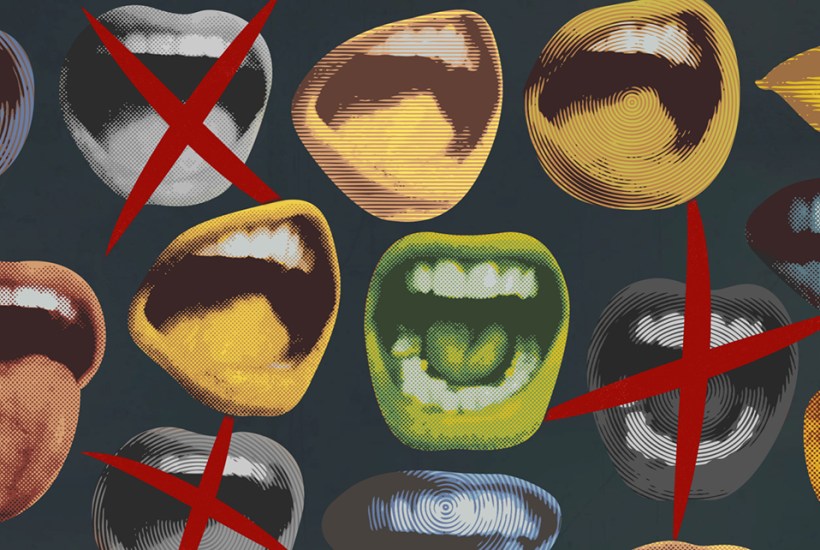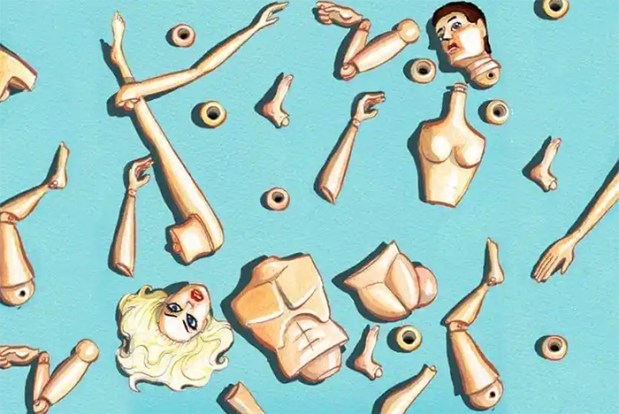The award for the funniest joke at this year’s Edinburgh Fringe was won by Lorna Rose Treen, with this: ‘I started dating a zookeeper, but it turned out he was a cheetah.’ There you go. It’s hard to know where to begin, isn’t it? Maybe with the fact that the joke doesn’t really work. Why would a zookeeper be a cheetah? Just because his work may involve looking after them? There’s no sense to it: the bloke just works in a zoo. If she’d said ‘I started dating a big cat – turned out he was a cheetah’, then that still wouldn’t be terribly funny but it would at least have semantic integrity. The second thing to say is that Lorna’s joke quite possibly was the funniest thing said throughout the ghastly festival, because they’ve banned all the stuff that’s really funny. Lorna, who professed herself ‘chuffed’ with her award, is what they are left with.
You may have read that the Leith Arches venue banned Graham Linehan from appearing because his view on transgender issues is only shared by the majority of the population. Linehan – who was one of the writers of Father Ted, among other things – has seen his career cancelled and it has cost him money and his mental health. Anybody who says anything which transgresses or lampoons the absurd shibboleths of the radical left will find themselves similarly estranged.
And so, in a sense, comedy has become a kind of anti-comedy, in which stand-up routines simply reflect the audience’s own prejudices and opinion and risk offending absolutely nobody, which is kind of the opposite of what comedy should be.
The journalist David Stubbs is among those who welcome this transformation. Hehas written a book, Different Times: a History of British Comedy, which is exultant over the fact that we no longer tolerate jokes about race, religion, gender, disability, mental health, now that comedy has become, as he put it, ‘compassionate’. Commenting on the success of Mackenzie Crook’s situation comedy Detectorists (which is, I concur, very good), Stubbs says that the writers ‘take on the obligation of maintaining the mental health of those watching’.
What? They do? How incredibly bloody kind of them. That may be a wholly admirable, if misguided, project, but it has nothing whatsoever to do with humour. Again, in a sense, it is anti-humour. And Stubbs’s notion of compassion is not of something which should be equally spread around – black people and lesbians are allowed it, for example, but not members of the Conservative party (he has a long screed of very uncompassionate hatred for the Tories) or anyone who disagrees with the party line.
What this idiot is talking about, then, is something we might call contingent compassion – you are allowed it only if you agree with his vapid world view. Otherwise, you’re out. Stubbs and his fellow travellers insist that they do not like comedy which ‘punches down’ – but that gives you an insight into their ideology. It is only ‘punching down’ if you consider black and Asian people, for example, beneath you. If you consider them – and lesbians and transgender people and the disabled – not to be simply victims, but essentially no different from anyone else, then it is not ‘punching down’ at all.
The point of comedy is to poke away with glee and guile at the stuff which lurks darkly in our unconscious. As Freud put it, jokes let out forbidden thoughts. The fulcrum of the best comedy should always foster within us a certain discomfort, and the punchline will recognise that discomfort and achieve a resolution by letting us howl with laughter – at least in part at ourselves for having harboured these thoughts within us. The laughter which comes, then, is truly cathartic. Comedy is also utterly dependent upon time and place, and jokes tend, like Cobalt 60, to have a half life of only half a dozen years or so. That is why the samizdat jokes told in the old Soviet Union seem a little lame today, but produced guffaws when they were originally told.
In short, jokes are about us and in the best joke the joke is always on us. Stubbs’s view of comedy is that it should do absolutely none of that. It should challenge nothing, least of all the audience. His idea of humour is authoritarian and tyrannical: it demands we obey, and nothing else. It reveals nothing.
Why did the chicken cross the road? One of the first jokes I ever heard and I didn’t find it terribly funny. ‘To get to the other side’ is the answer. It is a joke which mocks the listener for trying to fathom out why a chicken would cross a road. But then how about this? Why did the feminist cross the road? There are loads of answers, all of them worth a short guffaw. ‘Because I told her to’ is my favourite, largely because I made it up. Only works if it’s a bloke saying it. But then there’s the more predictable ‘Why the hell shouldn’t she?’ These jokes work because feminism as a paradigm must not be gainsaid in polite discourse – but there lurks within many people a certain resistance to it, a resistance they themselves may feel uneasy about.
And then there’s this. Why did the Muslim cross the road? Answer: the force of the blast. I made that up, too. But I think it works because it nips and niggles away at deep-seated prejudices within us which must, these days, remain unvoiced. If we’re equating Muslims with terrorists, the joke’s about us.
That is what comedy can do: at its best it can provide a kind of liberation from tyranny and authoritarianism, while asking us to question our own responses. It does the very opposite of what David Stubbs thinks it should do – it offers no compassion and revels in the brief discombobulation of our mental health.
Got something to add? Join the discussion and comment below.
Get 10 issues for just $10
Subscribe to The Spectator Australia today for the next 10 magazine issues, plus full online access, for just $10.
You might disagree with half of it, but you’ll enjoy reading all of it. Try your first month for free, then just $2 a week for the remainder of your first year.














Comments
Don't miss out
Join the conversation with other Spectator Australia readers. Subscribe to leave a comment.
SUBSCRIBEAlready a subscriber? Log in